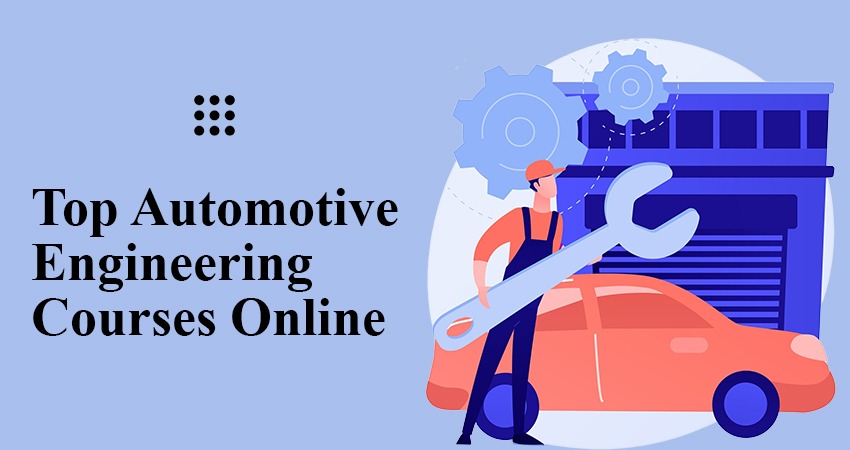Top Automotive Engineering Courses Online from Engineers Heaven's Idea / Prospect

The world of automotive engineering is changing so rapidly today. Today's industry is going from electric vehicles to driverless cars, all designed in previously unseen ways. As a result, the engineer is always the one running out in front. To keep ahead of the pack, you must constantly learn.
Online courses are a perfect way of doing that. Take a course from wherever and whenever you want, upgrading your technical and professional competence. Which automotive engineering courseis right for you? With so many choices available, picking the right one can be arduous.
Why Choose Online Automotive Engineering Courses?
Online learning offers flexibility, affordability and access to international expertise. Whether you are a student, a seasoned professional, or simply an enthusiast, these courses can help you:
- Master the newest automotive technology.
- Study with industry leaders.
- Obtain practical experience through hands-on projects.
- Advance your career with certification from top institutions.
Now let's look at the best courses on offer.
- Vehicle Dynamics by SAE International
Platform: SAE International
Self-paced
Key Topics: Suspension, steering, ride comfort, handling
This course is essential for anyone who wants to understand how cars move. It covers everything from fundamental physics to advanced dynamics. Included are topics on the effect suspension and steering have on performance. The course is beneficial to professionals wishing to enhance their technical skills.
- Electric Vehicle Fundamentals by Coursera
Platform: Coursera (Offered by Delft University of Technology)
Duration: 6 weeks
Key Topics: Battery technology, electric motors, energy management
Given the impending arrival of electric cars (EVs), this course provides fundamental knowledge. It describes how EVs work, how energy is stored in batteries and the paradigm by which motors mainly convert power into motion. This course is an excellent starting point if you want to enter the EV industry.
- Automotive Embedded Systems by Udemy
Platform: Udemy
Duration: 8 hours
Key Topics: Embedded C programming; automotive controllers; CAN protocol
Modern cars are heavily dependent on embedded systems. This course shows you how software affects vehicle functions. Today, just by paying attention in class, you will learn about sensors, microcontrollers and communication protocols like CAN. For those who want to get a foot in the door of automotive software design shortly, this is indeed an excellent course
- Internal Combustion Engines by MIT OpenCourseWare
Platform: MIT OpenCourseWare
Duration: Self-paced
Key Topics: Engine thermodynamics, fuel combustion, emissions
Combustion is the birthplace of the engine. This free course offered by MIT will allow us to analyze internal combustion engines (ICE). It tells us how fuel burns, how heat changes into power and how emissions are controlled. If you want a solid grounding in traditional engine technology, this course is priceless
- Autonomous Vehicle Engineering by edX
Platform: edX (Offered by Columbia University)
Duration: 12 weeks
Key Topics: AI in self-driving cars, sensor technology, path planning
Self-driving cars are the way of the future, and this course covers a great deal about them. This course is valuable if you are interested in artificial intelligence (AI) and want to go deep into sensors that allow vehicles to drive autonomously.
- Automotive Design and Manufacturing by Alison
Platform: Alison
Duration: 5-6 hours
Key Topics: Car design, manufacturing processes, material selection
This free course explains how cars are designed and manufactured. It covers the whole manufacturing process, from a design sketch to building the final product. Whether or not you are interested in automobile design, this course will offer you a good foundation.
How to Choose the Right Course?
The proper course depends on what your goals are. Ask yourself:
- Do I want to learn about traditional engines or electric vehicles?
- Am I interested in software, design, or manufacturing?
- Do I need a certificate of some kind for my career?
If you are not sure, Engineer Heaven can help you. Our platform provides guidance and recommended resources for all levels of engineers, from pros to newbies.
The final word
The automotive industry is changing rapidly, and to stay up to date is not a choice but a necessity. In online courses, you can learn what is needed, whether your ambitions lie with electric cars, self-driving technology or traditional.Visit Engineer's Heaven today to findthe best resources and advice in automotive engineering career management. Start learning. Stay ahead. Drive the future.
(Disclaimer: This statistics could be different in different part of World and Different timeline. this statistics has been generated based on data available till 2025 or relavant time span.)

The Wall